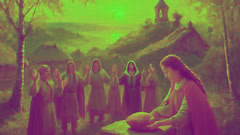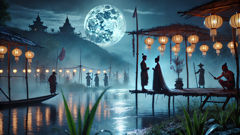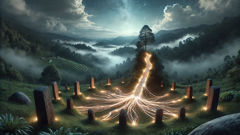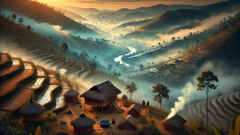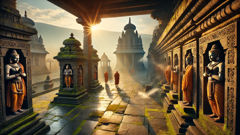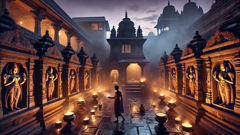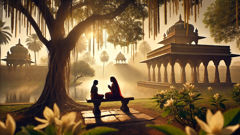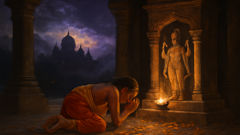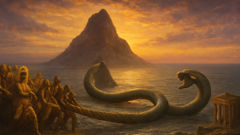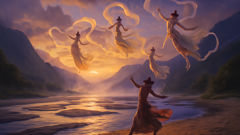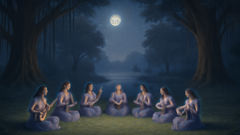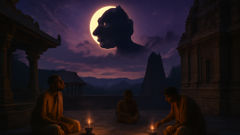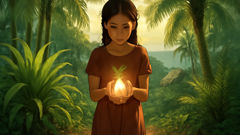Introduction
In the rolling lands of ancient Ukraine, when river mists curled like the fingers of sleeping gods and forests stretched unbroken for days, a people lived beneath the watchful gaze of the sun. To them, the sun was not merely a celestial body but Dazhbog himself—a radiant deity whose warmth and light stirred the black earth awake each spring. Across the golden plains and wild woods of Kievan Rus’, every sunrise was a promise, every sunset a story. From the domed city of Kyiv to the farthest reaches of the steppe, generations traced their roots to Dazhbog, calling themselves his grandchildren. They honored him with bread left on stone thresholds, with sung prayers at dawn, and with festivals that spilled color into the heart of winter. But the sun’s blessing was not always gentle. Sometimes it scorched the land, sometimes it hid for days behind a shroud of clouds, and sometimes, it sent omens—bright streaks across the sky or strange circles in frozen lakes. The people watched, wondered, and told tales by firelight, shaping their understanding of the world and their place within it. Their stories intertwined with the wind in the birches, the laughter of streams, and the roar of wolves in the midnight dark. This is the tale of Dazhbog’s grandchildren—a tale woven from sunlight and shadow, memory and myth, where mortals walk alongside gods, and every heart carries a spark of the sun.
The First Spark: Birth of Dazhbog’s Line
At the edge of the wild, where the northern pines met the endless southern grasslands, the first of Dazhbog’s mortal children was born under a sky so clear it seemed painted by the god’s own hand. The old ones said that the child’s mother, a shepherdess named Olena, was visited by a being of light during the longest day of the year. He came wrapped in gold and flame, with eyes that held the dawn. She alone saw him, though the sheep in the meadow trembled and the grass itself seemed to hum. Nine months later, Olena gave birth to a boy whose first cry echoed like a lark’s song at sunrise. They called him Sviatosar—'gift of holy light.'
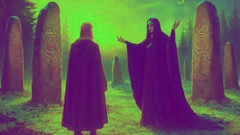
Sviatosar grew with the strength of the sun in his veins. His hair gleamed even in winter’s gloom, and his laughter could coax crocuses from frozen ground. Yet he was not untouched by sorrow. As he became a man, his mother’s health faded, and the sky darkened with heavy clouds. For seven days and nights, rain lashed the village, and the river threatened to sweep away their homes. Sviatosar knelt beside his mother’s bed, whispering prayers to Dazhbog. On the dawn of the seventh day, Olena’s breath slowed, then stilled. The moment her soul left, the clouds parted and sunlight burst through, warming the land.
Grief and gratitude warred within Sviatosar’s chest. He rose from his knees, stepped into the yard, and lifted his face to the sky. The villagers gathered around him, drawn by something they couldn’t name. As sunlight struck his brow, the air shimmered, and for an instant, every blade of grass glowed. Old Matviy, the village storyteller, fell to his knees. 'He carries the god’s fire,' he whispered. From that day forward, Sviatosar was seen as the first true grandchild of Dazhbog—a bridge between mortals and the sun god.
Years passed. Sviatosar’s fame spread across the rivers and forests. He healed with his hands, blessed the fields, and led festivals that brought fortune even in lean years. Yet the gifts of gods are never given freely. One cold autumn, an omen appeared: a ring of fire hung around the sun at midday, and the elders gathered in hushed fear. The rivers froze early, and wolves grew bold enough to approach the village gates. Sviatosar dreamed nightly of a woman in a white shroud, her eyes deep as shadowed lakes, calling to him from the northern lights.
He sought counsel from the shrine in the hills, where the oldest stones bore the sun’s spiral. There, in the chill before dawn, he met Morana, goddess of winter and death. She stood in silence, her hair long as midnight, her touch as cold as river ice. She spoke in riddles, warning that the balance of light and dark must be honored. 'You are Dazhbog’s blood,' she said, 'but remember: too much sun scorches as surely as too little freezes.' Sviatosar returned home changed, carrying both the warmth and the warning in his heart.
His descendants remembered the lesson. Every midsummer, they celebrated the sun’s peak—but every midwinter, they honored the dark, telling stories of Sviatosar’s meeting with Morana. Thus began the duality at the heart of Dazhbog’s line: to cherish both the fire that gives life and the shadow that lets it rest.
Legends in the Loom: The Sun’s Children Across the Land
From Sviatosar’s line came many children, each shaped by the sun’s light in their own way. The tales tell of Mstyslava, whose laughter was as bright as morning; of twins Bohdan and Bohdana, who could track deer by moonlight and call fish to leap from the river with a song; of old Babusya Lyubava, who spun flax so fine it shimmered like spider silk in summer dawns.
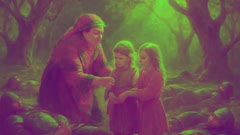
The villages of Kievan Rus’ saw themselves in these legends. As the years unspooled like thread from a distaff, families told stories around fires—each story adding a new motif to the tapestry of Dazhbog’s grandchildren. Some said the god’s line was marked by golden eyes; others claimed their skin was always warm to the touch, even in January’s coldest wind. What all agreed upon was this: wherever a child of the sun walked, fortune and renewal followed.
But envy grows where light shines bright. In the shadowed forests north of Kyiv, a lord named Chornoboh—rumored to be kin to dark gods—watched the sun’s people with growing resentment. His lands were shrouded in mist, his fields thin and rocky, and his heart colder than November frost. Chornoboh sent spies to watch the sun-born, seeking their secret. The spies returned with tales of rituals at dawn, of bread and honey left on stones, of laughter that made flowers bloom. But none could steal the sun’s spark.
One summer, when wheat bowed heavy and bees swarmed thick as clouds, Chornoboh sent a band of raiders to seize Bohdan and Bohdana. The twins vanished like dew at noon. The villagers searched for days, calling to the river and forest spirits for help. It was Lyubava—the old spinner—who followed a trail of strange silence deep into the woods. There she found Chornoboh’s men, sleeping under a twisted oak. She sprinkled grains of rye around them, whispered a prayer to Dazhbog, and sang a song so sweet the branches bent low to listen. The twins awoke, unharmed, and slipped from their bonds like shadows slipping from sunlight.
When Chornoboh himself tried to curse the land, the sun rose three times in a single day, blinding his warriors and setting fire to his banners. The people rejoiced, dancing until their feet ached and their throats grew hoarse. Yet Lyubava warned, 'Even the brightest fire must be tended, or it burns out of control.' And so, gratitude became a ritual, woven into every harvest and every song.
Seasons turned. New generations learned to balance boldness with humility, joy with respect for the unseen forces that shaped their world. Dazhbog’s grandchildren did not rule as lords or conquerors—they walked among their neighbors as healers, guides, and storytellers, keeping the memory of the sun alive in every heart.
The Golden Shield: Faith and Courage at the Crossroads
As the centuries unfurled, Kievan Rus’ became a crossroads—a meeting place for merchants, warriors, scholars, and pilgrims journeying between distant lands. With them came new gods and stories, brought by tongues foreign and strange. Some villagers feared these changes; others welcomed them as proof of Dazhbog’s ever-widening light.
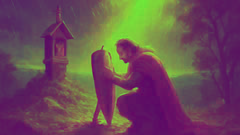
In one such village—a place where three rivers met—there lived a boy named Yaromyr, descendant of Sviatosar through many generations. Yaromyr was curious, stubborn, and restless. He dreamed of seeing cities made of stone and towers that touched the sky. Yet he never missed a dawn offering at the sun-stone, nor did he let a day pass without honoring his ancestors. When rumors spread of raiders on the steppe and strange ships on the southern horizon, Yaromyr’s village prepared for trouble.
One stormy night, a band of warriors clad in iron and bearing foreign banners swept through the region. Fires burned in the distance, and many villages fell silent. Yaromyr’s family gathered in their house, clutching amulets shaped like suns and muttering prayers for protection. But Yaromyr would not hide. He took his grandfather’s old shield—a relic said to be blessed by Dazhbog himself—and climbed to the village’s hilltop shrine. There, in the driving rain, he planted the shield upright and lit a fire at its base.
As thunder rumbled and wind howled, Yaromyr knelt in mud and flame, refusing to abandon his post. The warriors approached, their torches flickering. But as they neared the shrine, the storm parted for a brief moment. A shaft of sunlight—impossible at midnight—broke through the clouds and struck Yaromyr’s shield. The iron flashed gold, dazzling the intruders and sending them fleeing in terror. Villagers emerged to find Yaromyr soaked and shivering but unharmed, clutching the shield as if it were the sun itself.
From that day, Yaromyr was known as the Keeper of the Golden Shield. He grew to be a wise leader who welcomed travelers, traders, and storytellers from every corner of the world. Under his guidance, the village became a haven where old gods and new could meet in peace. The story of Yaromyr’s midnight vigil spread far beyond the rivers, inspiring others to hold fast to faith and courage even when darkness pressed close.
Conclusion
And so, the legacy of Dazhbog’s grandchildren lived on—not in palaces or monuments, but in the hearts and stories of the people. Each dawn brought new hope, each sunset a chance to remember that light and darkness exist in balance. In every ritual, festival, and whispered prayer, the old lessons endured: to honor nature’s cycles, to cherish courage alongside humility, and to see divinity in the world’s everyday wonders. When winter lingered too long or storms threatened the fields, villagers turned their faces to the sky—not in fear, but with trust that the sun would return. They saw themselves not as rulers over the earth but as stewards, carrying a spark of Dazhbog’s fire forward with every generation. Today, the echoes of their tales linger in the songs of Ukraine’s rivers, in the gold of its wheat fields, and in the resilience of its people. For as long as stories are told and bread is broken beneath the sun, Dazhbog’s grandchildren remain—woven into the land itself, glowing quietly in every heart.

